Oedipus was the mythical king of Thebes.
Contents
Oedipus may also refer to:
- Oedipus (horse), an American Thoroughbred racehorse
Oedipus was the mythical king of Thebes.
Oedipus may also refer to:
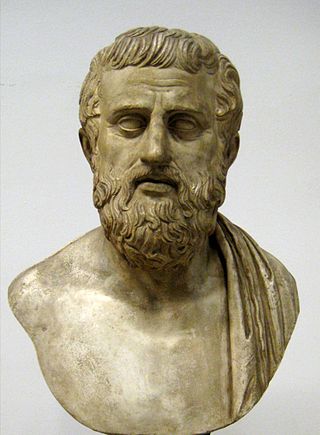
Sophocles was an ancient Greek tragedian, known as one of three from whom at least one play has survived in full. His first plays were written later than, or contemporary with, those of Aeschylus; and earlier than, or contemporary with, those of Euripides. Sophocles wrote over 120 plays, but only seven have survived in a complete form: Ajax, Antigone, Women of Trachis, Oedipus Rex, Electra, Philoctetes, and Oedipus at Colonus. For almost fifty years, Sophocles was the most celebrated playwright in the dramatic competitions of the city-state of Athens which took place during the religious festivals of the Lenaea and the Dionysia. He competed in thirty competitions, won twenty-four, and was never judged lower than second place. Aeschylus won thirteen competitions, and was sometimes defeated by Sophocles; Euripides won four.
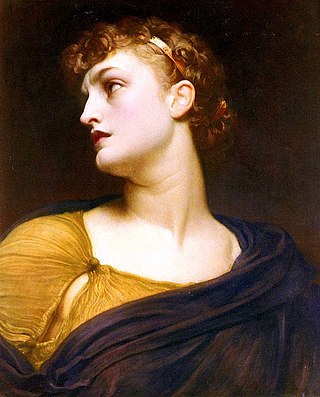
In Greek mythology, Antigone is a Theban princess and a character in several ancient Greek tragedies. She is the daughter of Oedipus, king of Thebes; her mother is either Jocasta or, in another variation of the myth, Euryganeia. She is a sister of Polynices, Eteocles, and Ismene. The meaning of the name is, as in the case of the masculine equivalent Antigonus, "in place of one's parents" or "worthy of one's parents". Antigone appears in the three 5th century BC tragic plays written by Sophocles, known collectively as the three Theban plays, being the protagonist of the eponymous tragedy Antigone. She makes a brief appearance at the end of Aeschylus' Seven against Thebes, while her story was also the subject of Euripides' now lost play with the same name.

Tragedy is a genre of drama based on human suffering and, mainly, the terrible or sorrowful events that befall a main character or cast of characters. Traditionally, the intention of tragedy is to invoke an accompanying catharsis, or a "pain [that] awakens pleasure,” for the audience. While many cultures have developed forms that provoke this paradoxical response, the term tragedy often refers to a specific tradition of drama that has played a unique and important role historically in the self-definition of Western civilization. That tradition has been multiple and discontinuous, yet the term has often been used to invoke a powerful effect of cultural identity and historical continuity—"the Greeks and the Elizabethans, in one cultural form; Hellenes and Christians, in a common activity," as Raymond Williams puts it.
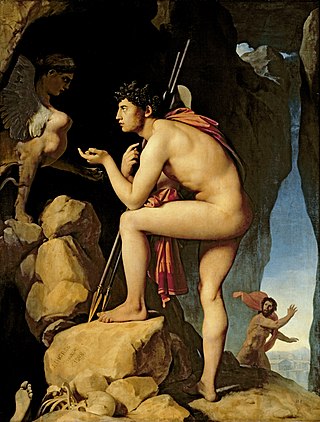
Oedipus was a mythical Greek king of Thebes. A tragic hero in Greek mythology, Oedipus fulfilled a prophecy that he would end up killing his father and marrying his mother, thereby bringing disaster to his city and family.

In Greek mythology, Jocasta, also rendered Iocaste and also known as Epicaste, was a daughter of Menoeceus, a descendant of the Spartoi Echion, and queen consort of Thebes. She was the wife of first Laius, then of their son Oedipus, and both mother and grandmother of Antigone, Eteocles, Polynices and Ismene. She was also sister of Creon and mother-in-law of Haimon.
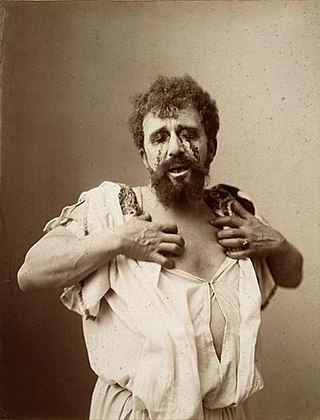
Oedipus Rex, also known by its Greek title, Oedipus Tyrannus, or Oedipus the King, is an Athenian tragedy by Sophocles that was first performed c. 429 BC. Originally, to the ancient Greeks, the title was simply Oedipus (Οἰδίπους), as it is referred to by Aristotle in the Poetics. It is thought to have been renamed Oedipus Tyrannus to distinguish it from Oedipus at Colonus, a later play by Sophocles. In antiquity, the term "tyrant" referred to a ruler with no legitimate claim to rule, but it did not necessarily have a negative connotation.
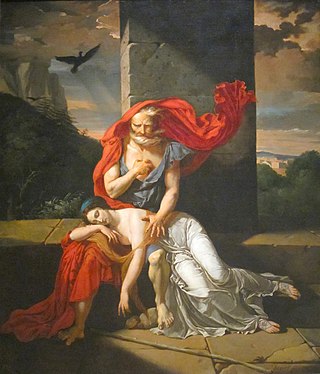
Oedipus at Colonus is the second-last of the three Theban plays of the Athenian tragedian Sophocles. It was written shortly before Sophocles's death in 406 BC and produced by his grandson at the Festival of Dionysus in 401 BC.
Antigone is the daughter of Oedipus and his mother Jocasta in Greek mythology.

Senecan tragedy refers to a set of ten ancient Roman tragedies, eight of which were probably written by the Stoic philosopher and politician Lucius Annaeus Seneca. Senecan tragedy, much like any particular type of tragedy, had specific characteristics to help classify it. The three characteristics of Senecan tragedy were: five separate acts, each with a Chorus; recounting of ‘horrors’ and violent acts, which are usually done off-stage; and some sort of parallel of the violence that occurred. Only the Phoenissae departs from the five act structure. In the English literary canon, Seneca appears as a major influence on later texts about revenge, such as Titus Andronicus and The Crying of Lot 49.
A kommos is a lyrical song of lamentation in an Athenian tragedy that the chorus and a dramatic character sing together. It is also found in comedies with certain peculiarities. A kommos occurs "when the tension of the play rises to a climax of grief or horror or joy". Examples include the final section of Aeschylus' The Persians in which Xerxes laments the defeat of his Persian army, the final appearance of Antigone in Sophocles' Antigone, the interaction between the chorus and Oedipus when he returns having blinded himself in Sophocles' Oedipus Rex, and the exchange between Orestes, Electra and the chorus immediately after Clytemnestra's murder in Euripides' Electra.

"Music for a While" is a da capo aria for voice, harpsichord and bass viol by the English Baroque composer Henry Purcell.

The heroic drama Oedipus: A Tragedy, is an adaption of Sophocles' Oedipus Rex, written by John Dryden and Nathaniel Lee. After being licensed in 1678 and published in 1679, it became a huge success on stage during the Restoration period.
Phrike is the spirit of horror in Greek mythology. Her name literally means "tremor, shivering", and has the same stem as the verb φρίττω (phrittō) "to tremble". The term "Phrike" is widely used in tragedy.

Oedipus Rex is a 1967 Italian film directed by Pier Paolo Pasolini. Pasolini adapted the screenplay from the Greek tragedy Oedipus Rex written by Sophocles in 428 BC. The film was mainly shot in Morocco. It was presented in competition at the 28th Venice International Film Festival. It was Pasolini's first feature-length color film, but followed his use of color in "The Earth Seen from the Moon" episode in the portmanteau film The Witches (1967).
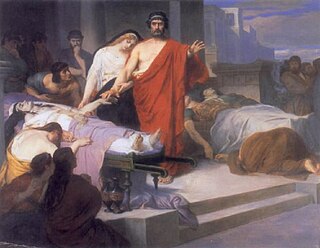
Oedipus is a fabula crepidata of c. 1061 lines of verse that was written by Lucius Annaeus Seneca at some time during the 1st century AD. It is a retelling of the story of Oedipus, which is better known through the play Oedipus Rex by the Athenian playwright, Sophocles. It is written in Latin.

Charles François Jalabert (1819–1901) was a French painter in the academic style. He rapidly gained renown as an artist among Parisian high society in the second half of the 19th century and attended the salon of Madame Sabatier. Some of his works are now in the Musée des Beaux-Arts de Nîmes.
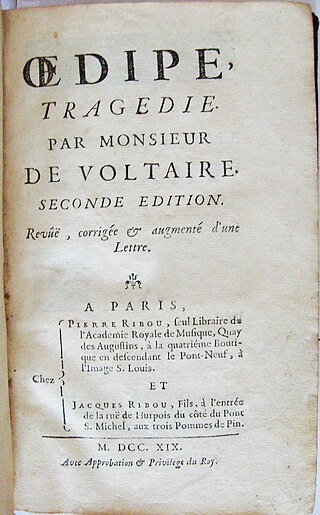
Oedipus is a tragedy by the French dramatist and philosopher Voltaire that was first performed in 1718. It was his first play and the first literary work for which he used the pen-name Voltaire.

Oedipus rex is an opera-oratorio by Igor Stravinsky, scored for orchestra, speaker, soloists, and male chorus. The libretto, based on Sophocles's tragedy, was written by Jean Cocteau in French and then translated by Abbé Jean Daniélou into Latin; the narration, however, is performed in the language of the audience.
Oedipus Rex is a play by Sophocles.
Philocles, was an Athenian tragic poet during the 5th century BC. Through his mother, Philopatho, he had three famous uncles: Aeschylus, the famous poet, Cynaegirus, hero of the battle of Marathon, and Ameinias, hero of the battle of Salamis. The Suda claims that Philocles was the father of the tragic playwright Morsimus, who was in turn the father of the tragedian Astydamas the Elder and was in his turn the father of the tragedian Astydamas the Younger.